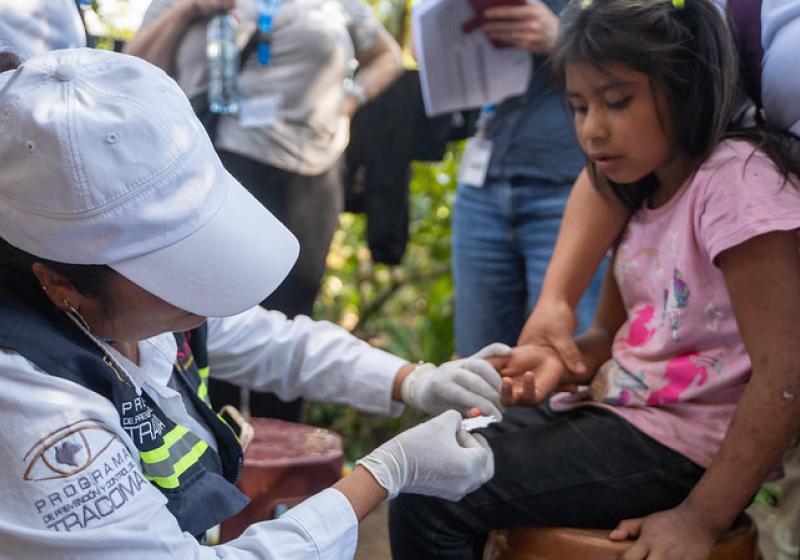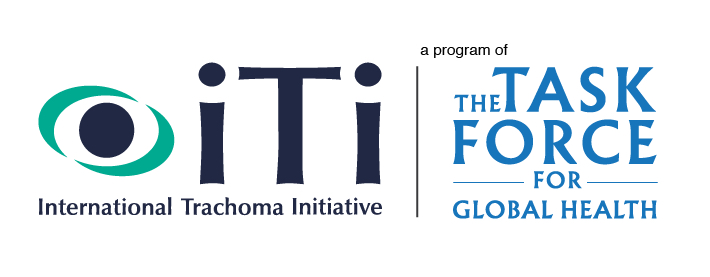
Tropical Data's Training in Guatemala Enhances Integrated Disease Surveillance with Serology
Tropical Data reached a milestone in Guatemala in February 2025, after supporting the first ever large-scale training workshop focused on the collection of samples as part of trachoma surveys.
The “Training of Trainers” (ToT) workshop was organized and hosted by the Pan American Health Organization (PAHO), with funding support from the Government of Canada through the "Trachoma Elimination Initiative in the Americas". With Tropical Data’s support, the aim was to equip health professionals in the Region with the expertise to implement high-quality trachoma ‘plus’ surveys.
‘Plus’ surveys are standard trachoma surveys where additional samples are collected, including conjunctival swabs to test for Chlamydia trachomatis (Ct) infection and/or Dried Blood Spots (DBS) to test for antibodies to the Ct antigen Pgp3. These complementary indicators generate additional data, which can help countries make decisions about whether interventions for trachoma control are needed, as they work towards eliminating the disease. They can also be useful during post-elimination surveillance.
Over the last 2 years, Tropical Data has worked to introduce a broader package of support for countries wishing to carry out trachoma ‘plus’ surveys. This ToT event offered an opportunity to pilot Tropical Data’s new training program for ‘plus’ surveys. This initial training helps to lay the foundation for future implementation, as Tropical Data works to adapt its methods to be able to fully support ‘plus’ surveys at scale.
The impact of this training will also extend beyond trachoma, supporting a broader effort led by PAHO to integrate surveillance and elimination efforts for different diseases across the Americas. At the center of these efforts is the use of serology, involving the collection of DBS.
Using Serology for Integrated Disease Surveillance
DBS samples enable multiplex testing, where a single sample can be used to test for several diseases. This integrated approach makes surveys more cost-effective, by avoiding the need to organize separate surveys for each disease. By adding DBS collection to trachoma ‘plus’ surveys, there is a more integrated understanding of disease epidemiology, with public health professionals able to screen for co-endemic diseases, track vaccine coverage, and enhance early detection of diseases.
Strengthening Regional Capacity towards Disease Elimination
The Guatemala ToT event trained 14 delegates from Brazil, Bolivia, Colombia, Ecuador, Guatemala, and Mexico, who will then be able to train others in their home countries, ensuring a ripple effect of capacity strengthening in the Region. By standardizing methodologies and reinforcing technical skills, the training will accelerate country efforts to implement trachoma surveillance and inform PAHO's broader Disease Elimination Initiative.
Trachoma Survey Methodology with Other Disease Surveillance
Trachoma surveys are founded on well-established, community-based data collection methods, and other disease programs have the opportunity to build on these existing structures, thus maximizing efficiency.
Trachoma surveys usually involve visiting a number of households within a certain area. A lesson learned from a recent study is that household-based, rather than school-based, surveys are likely to be the best option for integrated disease surveillance, as they cover a wider age range.
A Future of Collaborative Disease Elimination
The success of PAHO’s ToT workshop in Guatemala underscores the importance of collaboration in achieving bold global health goals. Being invited to support this effort provided Tropical Data with a valuable opportunity to pilot its newly developed training materials for ‘plus’ surveys in a new setting. As countries across the Americas work toward global and PAHO elimination targets, harmonizing surveillance efforts across diseases is more critical than ever. PAHO’s strategy to use integrated serosurveillance highlights how Tropical Data’s expanded support for ‘plus’ surveys confers benefits that extend beyond national trachoma programs. By leveraging the expertise built through Tropical Data’s training program and adopting approaches like DBS collection, we are advancing beyond trachoma elimination toward a broader, integrated surveillance model that will drive sustainable health improvements across the region.
To find out more about Tropical Data’s plans to support trachoma ‘plus’ surveys, please visit www.tropicaldata.org
Photo Credit: PAHO Guatemala

